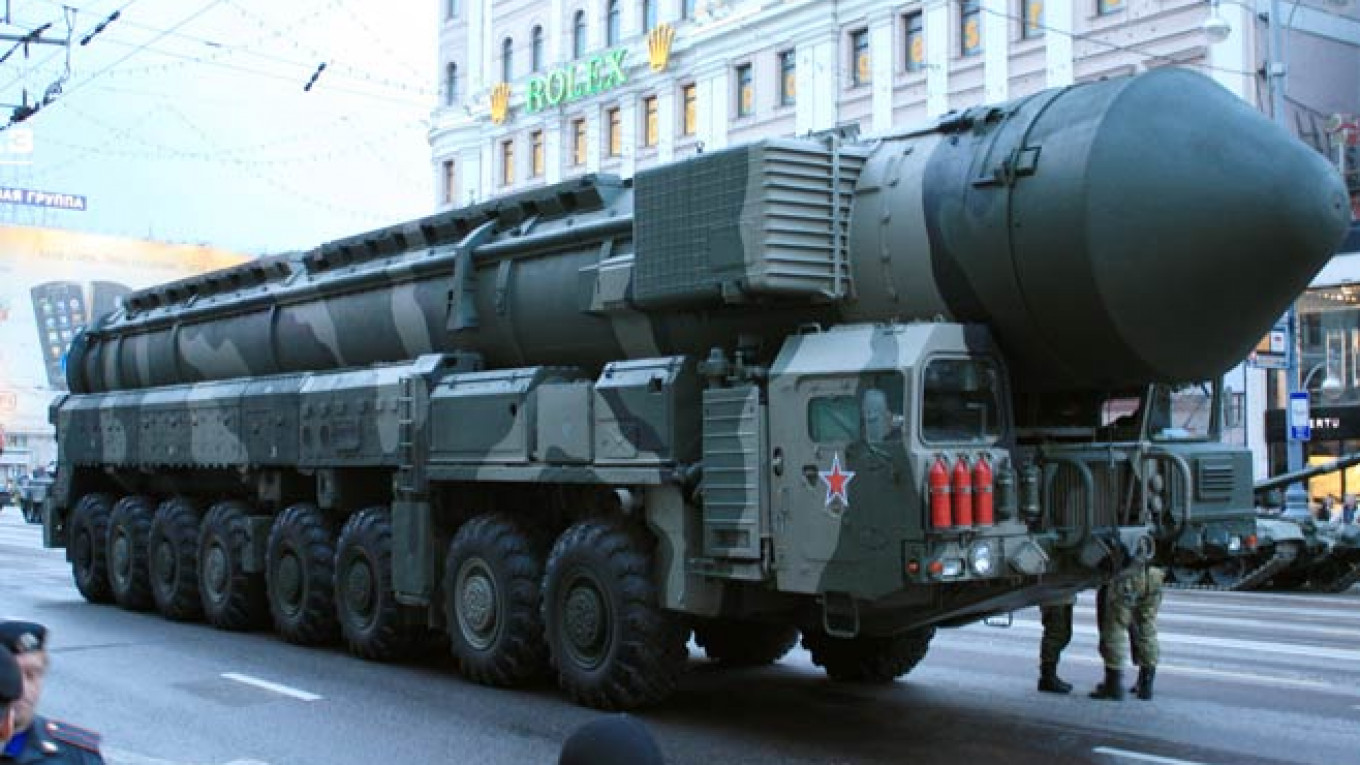Russian Armed Forces may replace the SS-18 Satan, the world's heaviest intercontinental ballistic missile, earlier than planned due to a standoff with Ukraine, where the missile was initially assembled and is serviced, defense experts said Thursday.
But while scrapping the missile and other joint projects mean "minor inconveniences" for Russia, a full breakup of relations would deal a death blow to Ukraine's defense industry, Russian military experts said.
In an effort to find ways to deal with possible disruptions of Ukrainian military imports to Russia, President Vladimir Putin chaired a meeting with defense authorities and industry CEOs on Thursday.
"We need to understand whether the threat [of supply disruptions] is real, how fast could it come, on which facilities we can localize production and how much will it cost," Putin said, opening the meeting, according to the official transcript on the Kremlin's website.
Russian and Ukrainian defense industries are closely intertwined, although over the last few years Russia has been making efforts to cut the level of mutual military dependence, said Sergei Grinyaev, the head of Moscow-based Center for Strategic Estimates and Forecasts, a nongovernment foreign affairs and national security think tank.
Until recently, strong ties with Ukraine remained in the field of aircraft engine production and military transport aviation, the analyst said.
There were earlier plans that Antonov aircraft maker, situated on the outskirts of Kiev, would produce medium-range An-70 military transport aircraft for Russia.
The two countries have been partners in the aerospace industry as well. Yuzhmash factory in Dnipropetrovsk has been participating in some of the Russian aerospace projects. It was also the maker of the SS-18 Satan missile and serviced the remaining few dozen missiles of this type employed by the Russian military.
While for Russia the consequences of the breakup are likely to be insignificant, it would mean a collapse of Ukraine's defense industry, which is more than 90 percent dependent on the Russian market, said Igor Kotchenko, chief editor at Russia's National Defense magazine and director of the Center of Analysis of World Arms Trade, a nongovernment research organization on arms markets and exports.
"In almost every segment of its defense industry Russia has a substitute for what is produced in Ukraine, under a strategic decision made at the time when Viktor Yushchenko was the president there," Kotchenko said.
The technical service and parts supplies for the Satan missiles could be a problem but nothing that cannot be solved, the expert said.
"If Ukraine stops cooperation with Russia, it would have to scrap what is left of the system not in seven to eight years, as was planned, but in two to three years," Kotchenko said, adding that Satan will be eventually replaced by the new Yars missile system anyway.
Ukraine has well-developed tank building facilities in Kharkiv and stopping cooperation with them would create some more problems for Russia's industry, said Alexei Fenenko, a leading research fellow at the Russian Academy of Sciences' Institute of International Security Studies.
"But over the years Russia has diversified its production in this sphere as well, something it has been doing since 1992 when doubts of future stability in Ukraine began," Fenenko said.
Contact the author at a.panin@imedia.ru
A Message from The Moscow Times:
Dear readers,
We are facing unprecedented challenges. Russia's Prosecutor General's Office has designated The Moscow Times as an "undesirable" organization, criminalizing our work and putting our staff at risk of prosecution. This follows our earlier unjust labeling as a "foreign agent."
These actions are direct attempts to silence independent journalism in Russia. The authorities claim our work "discredits the decisions of the Russian leadership." We see things differently: we strive to provide accurate, unbiased reporting on Russia.
We, the journalists of The Moscow Times, refuse to be silenced. But to continue our work, we need your help.
Your support, no matter how small, makes a world of difference. If you can, please support us monthly starting from just $2. It's quick to set up, and every contribution makes a significant impact.
By supporting The Moscow Times, you're defending open, independent journalism in the face of repression. Thank you for standing with us.
Remind me later.






